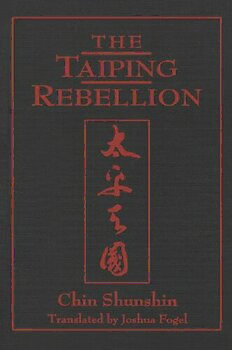
The Taiping Rebellion PDF
Preview The Taiping Rebellion
THE TAIPING REBELLIO N Cliin Slivinsliin Translated ky Joskua A. Fogfel An East Gate Book First published 2001 by M. E. Sharpe Inc. Published 2017 by Routledge 2 Park Square, Milton Park, Abingdon, Oxon OX14 4RN 711 Third Avenue, New York, NY 10017, USA Routledge is an imprint of the Taylor & Francis Group, an iriforma business Copyright© 2001 by CHIN Shunshin Original Japanese edition copyright © 1982 by CHIN Shunshin. All rights reserved. Original Japanese edition published by Kodansha, Japan, 1982. English translation rights reserved by Taylor & Francis, under the license granted by CHIN Shunshin through Seikyusha U.S.A. No part of this book may be reprinted or reproduced or utilised in any form or by any electronic, mechanical, or other means, now known or hereafter invented, including photocopying and recording, or in any information storage or retrieval system, without permission in writing from the publishers. Notices No responsibility is assumed by the publisher for any injury and/or damage to persons or property as a matter of products liability, negligence or otherwise, or from any use of operation of any methods, products, instructions or ideas contained in the material herein. Practitioners and researchers must always rely on their own experience and knowledge in evaluating and using any information, methods, compounds, or experiments described herein. In using such information or methods they should be mindful of their own safety and the safety of others, including parties for whom they have a professional responsibility. Product or corporate names may be trademarks or registered trademarks, and are used only for identification and explanation without intent to infringe. Cover calligraphy by Harrison X. Tu Library of Congress Cataloging-in-Publication Data Chin, Shunshin, 1924- (Taihei tengoku. English] The Taiping rebellion / by Chin Shunshin ; translated by Joshua A. Fogel. p. cm. "An East gate book" ISBN 0-7656-0099-04 (alk. paper) I. China--History-Taiping Rebellion, 1850-1864-Fiction. I. Fogel, Joshua A., I 950- 11. Title. PL847.15 T27 2000 895.6'35--dc21 99-049758 CIP ISBN 13: 978-0-7656-0099-8 (hbk) Contents 1. An Evening in Nagasaki 3 2. Men of Many Dreams 25 3. A Hero in the Setting Sun 46 4. Season of Thieves 67 5. Assemble at Jintian Village! 88 6. Objective: Penghua Mountain 108 7. The Men with Long Hair 124 8. Hoist the Flag! 139 9. Advances and Retreats 160 10. Correspondence from the Ryükyüs 181 11. Escape from the Jaws of Death 202 12. Attack the Rivers and the Mountains 225 13. Escape from Yongan 246 14. The Battle at Guilin 268 15. Aftermath of a Massacre 290 16. Movement North and South 311 17. Changsha Summer 329 18. Departure on a Rainswept Night 351 19. Birth of a Navy 374 20. Razing the Yellow Crane Tower 397 21. Hillock of the Nine Women 417 22. Jingkou Communiqué 441 23. Early Spring in Jinling 465 iii /V 24. The Yangzi River Flows to the East 489 25. Traffic on the Yangzi 511 26. Love and Hate in the City of Shanghai 533 27. East and West of the Heavenly Capital 556 28. Red Spots on the Yellow Earth 580 29. Secret Messenger of the Heavenly King 603 30. The Arrow Is in the Bow 625 31. The Collapse of the Finest Pagoda in the Realm 646 32. Victory and Defeat 667 33. Elegy for the Heavenly Capital 690 Translator’s Note What follows is an English translation of the entire text of Chin Shunshin’s long historical novel, Taihei tengoku. I have added an occasional word here or there to make the text clearer, but otherwise altered nothing. In addition, I have included the birth and death dates, where known, of a number of major historical personages who populate the pages of this work. I have not done this for the principal historical figures on the Taiping side. Their stories are told below, and I did not want to give away too much of the drama in ad vance. The connecting fiber tying together the various scenes and battles of the Taiping Rebellion—the Lian family—is entirely fictional. JAF February 2000 V T H E TAIPING REBELLIO N 1 An Evening in Nagasaki Waves were breaking in the shadows cast on the water by the circular moon. Undulating, flickering ... it was as if light and water were at play with one another. “So, this is good-bye. Take care,” urged the voice of a young man. “How can I ever thank you?” Lian Liwen said slowly in a faltering, un steady Japanese. The paper lantern held by the young man beside him illu minated a small boat by the shore. “I really didn’t do anything worthy of thanks,” said the young man as he lowered his head. “Masasuke, you’re so young and already so busy. That’s remarkable.” “Well, Mr. Lian, your Japanese certainly has improved, but so has your ability at flattery.” Lian laughed. “Not even a year has passed, has it?” “Perhaps we shall meet again,” said Lian Liwen as he stepped on board the boat. The black shadow of a Chinese vessel floated over the open sea. The boatman silently rowed, and soon the small craft was far from shore. The young man looking on from the shore held the lantern high. He had a long, thin face, that of someone still in his youth. Okubo Masasuke was in fact only twenty years old, by Japanese reckoning. As the boat carrying Lian Liwen approached the Chinese ship, he re moved the hood covering his head. The pigtail stuffed into the hood came dangling loosely down his back. Now he could see before him a rope ladder hanging from the ship’s deck. There, in the open sea before Bonotsu in the 3
